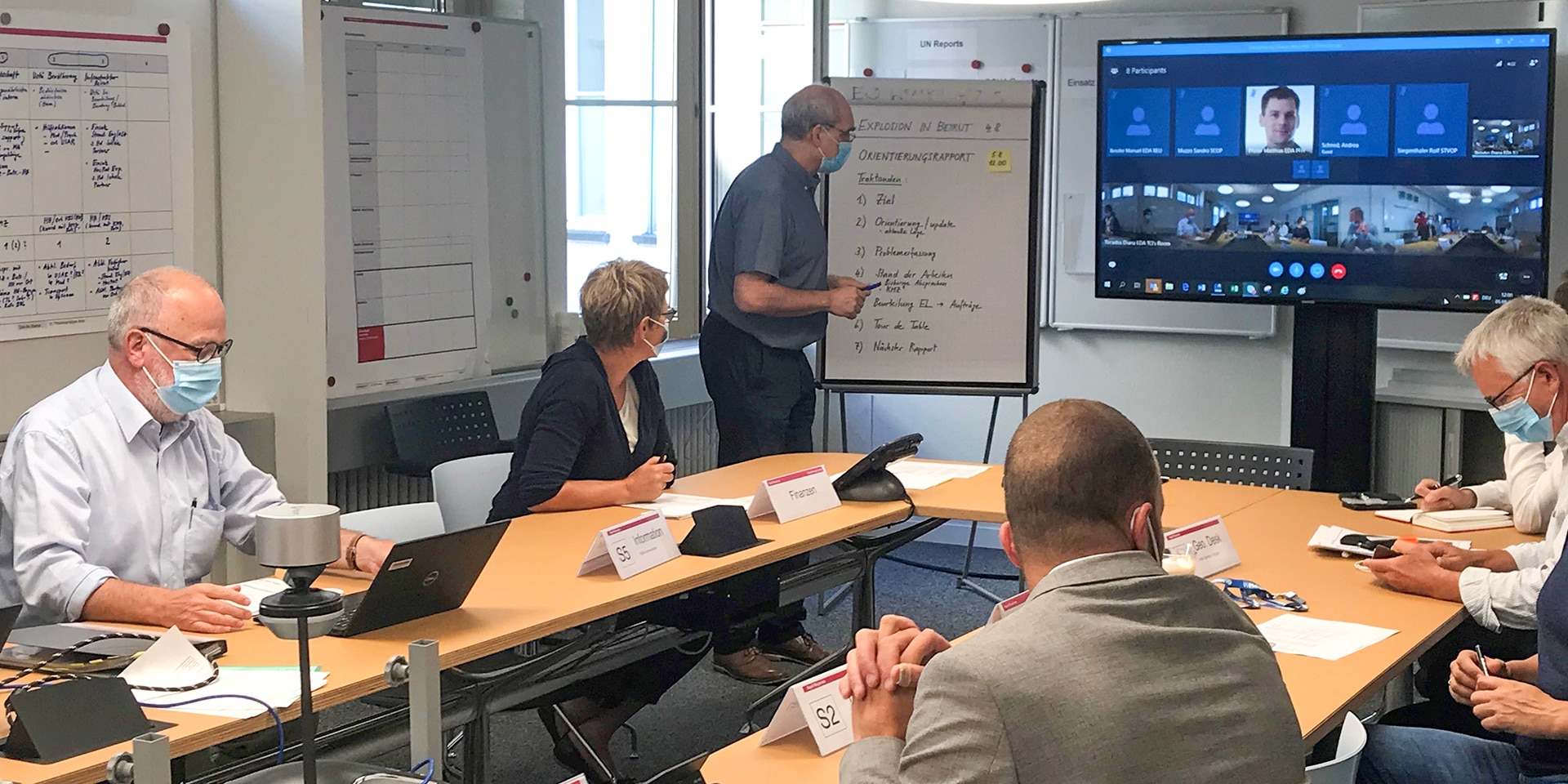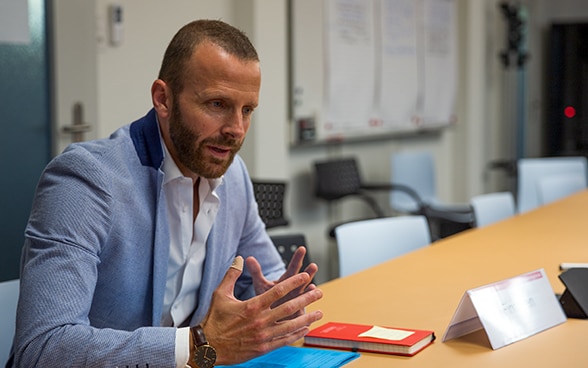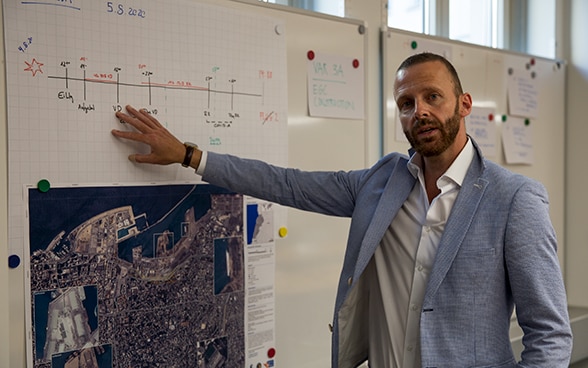"Each assignment is unlike any other"
A team of Swiss specialists arrived in Beirut on 6 August 2020. Thanks to their expertise and their experience, the members of the Swiss Humanitarian Aid Unit are able to provide rapid assistance on the ground and identify where further Swiss support makes sense. The team's mission is coordinated by Swiss Humanitarian Aid in Bern. Silvio Flückiger, head of the Staff Office and deputy head of the Humanitarian Aid Department, explains the stages from the first news of a disaster to the dispatch of the team.

Members of the operational management of Swiss Humanitarian Aid sit around a table and discuss the mission in Beirut. © FDFA
Silvio Flückiger, you sent the team of specialists to Beirut yesterday. Have you already received feedback from them?
Yes, we've spoken with the team. The specialists are directly integrated into the embassy's crisis management team. The embassy building has already been checked for structural integrity and the three civil engineers were able to give the green light. So the crisis management team was able to resume its work at the embassy today.

What criteria were used to select the members of the team of specialists for this mission?
First and foremost, we need to know what the needs on the ground are. In this specific case, which also involved supporting the embassy, we asked them what they needed from us. Because the structural integrity of the building had to be checked, we sent three experts in that field to do that. They inspected the embassy building and the staff members' apartments. As of this afternoon they are at the disposal of the Lebanese authorities and will be starting to inspect public buildings.
Owing to the particular situation in Beirut, we also offered to include a dangerous goods expert and a psychologist in the team.
With what specific mission did the specialists travel to Beirut?
The first priority was to help the embassy to ensure that the crisis management team was quickly restored to full operational capacity. The second priority was for an initial clarification to determine where humanitarian action on the ground makes sense. In the analysis, the medical sector, accommodation and construction were assessed as priority areas. This is also in keeping with the Lebanese authorities' request for assistance. We are currently preparing to send a second group of specialists, which will fly to Beirut tomorrow.
These specialists are members of the Swiss Humanitarian Aid Unit (SHA). Who's in this unit?
The SHA is our operational arm. It is proving itself once again in this crisis. It's a voluntary body, which is a typically Swiss solution. The SHA is made up of eleven specialist groups, including in the fields of construction, medicine, security and information. The members work in their actual professions. The civil engineers who are now in Lebanon, for example, work in the private sector. The dangerous goods expert teaches chemistry at the Zurich University of Applied Sciences, and the psychologist is self-employed.
Are SHA members able to travel to Lebanon at the drop of a hat?
If SHA members are in an employment relationship, it is agreed with their employer that they can be made available for assignments at short notice. As SHA members regularly attend courses, they are always ready for action in their specific task area.
For our part, in addition to their professional specialisation, we check which languages are required and who has already been on assignment in Lebanon. That way we ensure that the right person with the right profile and the right training is deployed in the right place.
And were the members for the mission in Beirut found quickly?
Yes, the specialists made themselves available in a very short time. But the process was somewhat complicated by the necessary COVID measures. We had to do COVID tests on Tuesday, but we found a solution in advance with the University of Zurich, so that the test results were available on Tuesday evening and the team was able to fly to Beirut without further delay. Incidentally, it was a doctor from the SHA who did the tests.

You are the manager of this operation. What are the steps you go through from the moment you receive news of a disaster to the departure of a team of specialists?
Swiss Humanitarian Aid has a full standby service, 24 hours a day. This is where we have our finger on the pulse, constantly monitoring and checking the situation around the world. When information comes in – as it did on Tuesday from Beirut – Manuel Bessler, the Swiss Confederation's delegate for humanitarian aid, is consulted to see whether the situation warrants an intervention. If that is the case, an Operational Control Group is convened and the crisis unit is assembled. In the current case, I have been designated as the operations manager.
How did it go on Tuesday?
The first step was to get a picture of the situation. We immediately contacted our embassy. On Wednesday we then had three crisis unit meetings, because the need for information in such situations is much greater than the information available. Once we have a reasonably reliable picture of the situation, tasks are distributed in order to prepare an aid package which is as credible and as fit for purpose as possible. For this reason, the crisis units always include specialists, in this case SHA members from the construction and medical sectors. The team in Beirut is led by a Swiss Humanitarian Aid staff member. He knows the mechanisms at head office in Bern – which is also important on such assignments!
Swiss Humanitarian Aid carries out missions all over the world. So is the current mission in Beirut just routine for you?
No. Each assignment is unlike any other. Of course we have experience from our previous assignments, which helps us to make the right decisions in situations where information is incomplete. But this case is unusual in that the Swiss embassy was also affected and that we, with our humanitarian personnel, must simultaneously support the Lebanese people and our own representation on the ground.
Swiss Humanitarian Aid
Swiss Humanitarian Aid acts before, during and after conflicts, crises and natural disasters to serve the interests of people in need. It focuses on the reconstruction and rehabilitation of affected areas, disaster risk reduction, the protection of vulnerable people and emergency relief efforts. Swiss Humanitarian Aid is part of the Swiss Agency for Development and Cooperation (SDC) within the Federal Department of Foreign Affairs (FDFA).
